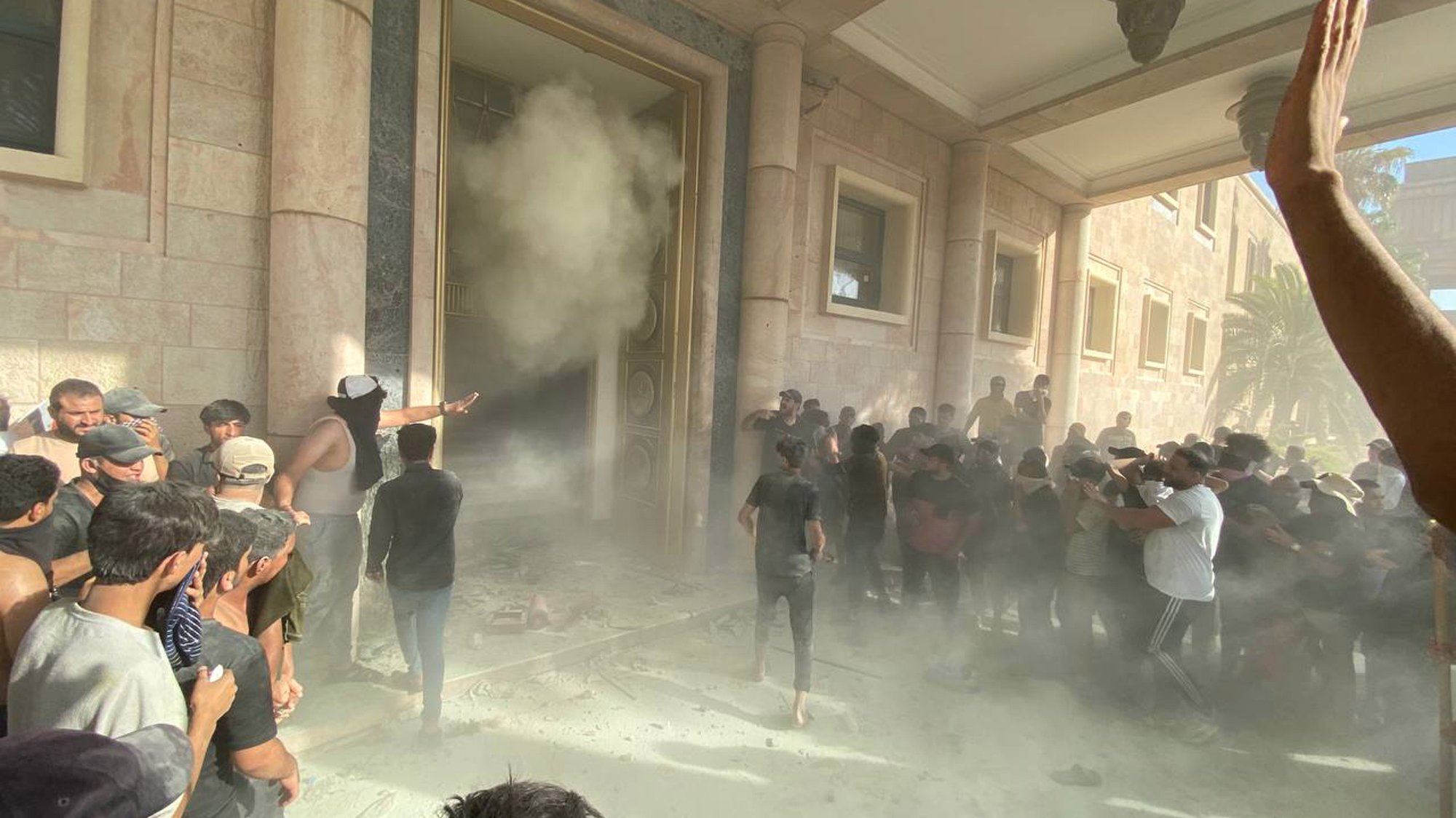(In update)
The clashes in the “Green Zone” of Baghdad, after the announcement of the “definitive withdrawal” of the policy of the Iraqi populist cleric Moqtada al-Sadr, caused at least 15 deaths and dozens of injuries on Monday, reports the Associated Press.
Iraq declared a curfew on Monday after shootings in the “Green Zone”, the international zone of the Iraqi capital, when the leader Moqtada al-Sadr announced his withdrawal from the political scene. A source interviewed by AFP revealed that the area was also bombed at least seven times. It is not clear who is responsible for the attacks.
Dozens of supporters of the religious and political leader invaded the Palace of the Republic, in the same area of the city, to express their discontent. The protesters settled into armchairs and jumped into the building’s swimming pool. Security forces tried to disperse the crowd using tear gas.
However, the police began to use live ammunition, increasing the climate of confrontation that was already taking place between supporters of Al-Sadr and supporters of opposition parties.
The situation in the “Green Zone” remains “tense”, despite the curfew decree. Mahmoud Abdelwahed, Iraq correspondent for Aljazeera, added that “there are no signs of de-escalation, at least for now.” “From time to time shots are heard (…). The ‘Green Zone’ is a battlefield for rival factions,” he declared.
The Iraqi prime minister calls for an investigation into the incidents in the “Green Zone”. António Guterres calls for “calm”
Iraqi Prime Minister Mustafa al-Kadhimi called for the opening of an “urgent” investigation into Monday’s events in Baghdad and stressed that the use of firearms against protesters is “strictly prohibited”, Aljazeera quoted the agency as saying. of Iraqi news INA. According to the same source, Al-Kadhimini urged the Iraqis to comply with the “instructions of the security forces” and the curfew.
In a brief statement issued late Monday, UN Secretary-General António Guterres called for “calm and restraint,” calling for steps to be taken to prevent an escalation of violence.
“The secretary general strongly urges all parties and those involved to overcome their differences and engage, without delay, in a peaceful and inclusive dialogue on a constructive path,” says the note, which reflects the concern with which Guterres follows the situation. in Iraq.
The secretary general @antonioguterres has been following with concern the ongoing protests in #Iraq This day.
It calls for calm and moderation, and urges all relevant actors to take immediate steps to de-escalate the situation and prevent any kind of violence.
???????? https://t.co/73HkEuRHHC
— UN Spokesperson (@UN_Spokesperson) August 29, 2022
Muqtada al-Sadr announces hunger strike
Al-Sadr will have announced the start of a hunger strike, which will last as long as violent actions continue in the streets of Baghdad, the Iraqi news agency and state television reported, according to Aljazeera. The news has not been officially confirmed.
Moqtada al-Sad announced on Monday his “definitive withdrawal” from the Iraqi political scene due to the political crisis affecting the country. Since the elections in October last year, Iraq has been without a government and without a president, after Al-Sadr’s party won, but with only 73 seats out of 329 in parliament.
“I decided to stop intervening in political matters. I announce my final withdrawal and the closure of all political institutions (of the Sadrist movement),” said the influential cleric and leader of the main party in Iraq.
Anticipating a scenario of clashes, Al-Sadr ordered elements of his closest circle not to comment on the ongoing events, nor use social networks to promote new acts of violence. The Shi’ite cleric also advised supporters not to fly the flags of the party, which was officially disbanded with Al-Sadr’s decision announced today.
Al-Sadr’s announcement came just 48 hours after he demanded the exclusion from the political scene of all the parties that have operated in Iraq since 2003 as a condition for overcoming the crisis that has been going on since the October elections.
Al-Sadr’s party tried to ally with other parliamentary forces to elect the President and the Prime Minister, who would be in charge of forming a government, which turned out not to be possible, due to the blockade of Shiite opponents, close to the Iranian regime. . Sadrist deputies resigned en bloc in June, but, faced with the election of a president and prime minister proposed by the opposition, Al-Sadr’s supporters occupied Parliament on July 30.
The occupation lasted a week and, after an appeal from the cleric, the Sadrists withdrew from Parliament and camped in front of the building, demanding the dissolution of the House and new elections.
Source: Observadora
